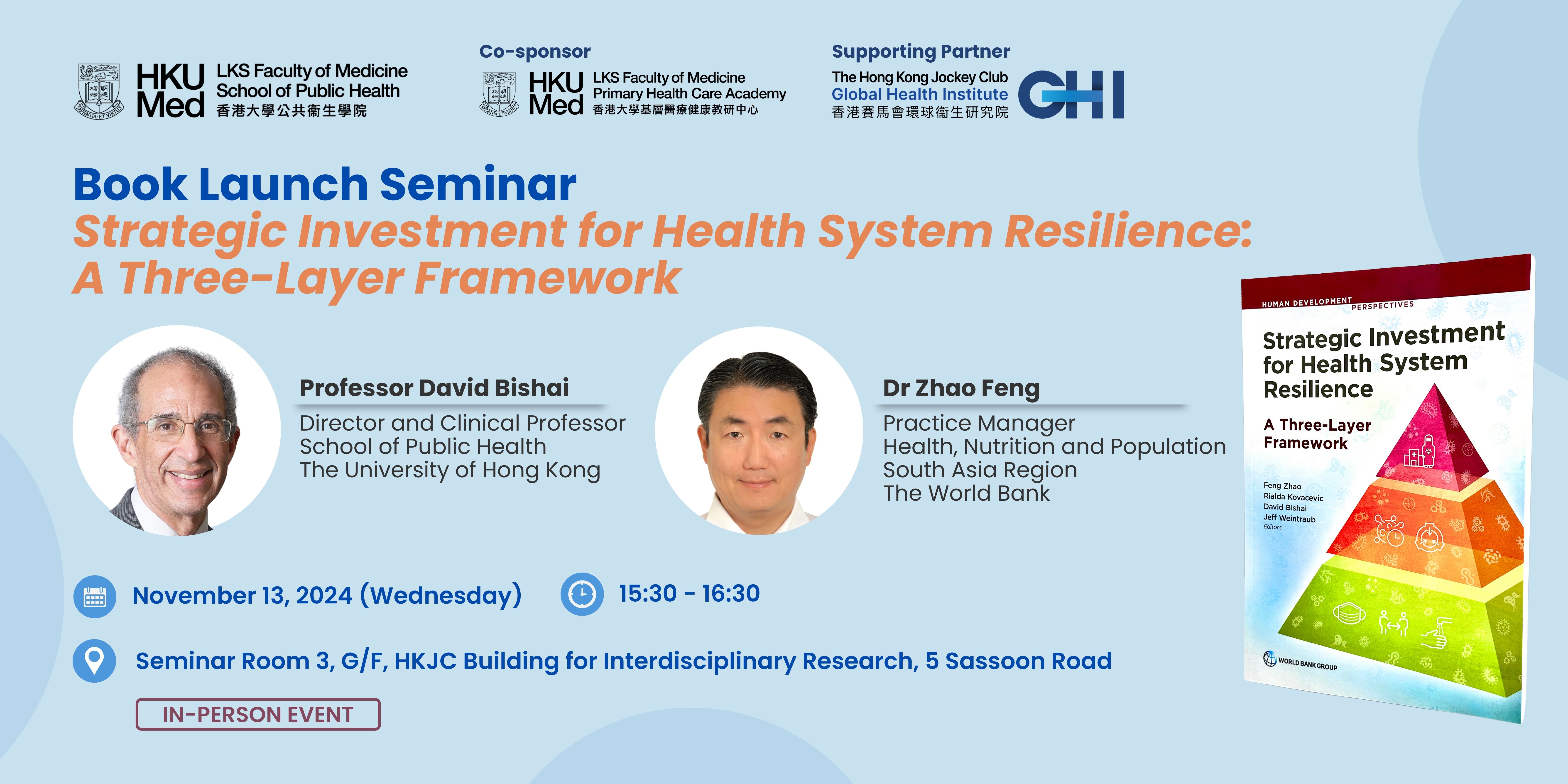Book Launch Seminar on “Strategic Investment for Health System Resilience: A Three-Layer Framework”

The School of Public Health of the University of Hong Kong will be hosting a book launch seminar by Dr Zhao Feng and Professor David Bishai, editors of the book “Strategic Investment for Health System Resilience: A Three-Layer Framework” published by the World Bank Group. Details are as follows:
|
Book Title: |
Strategic Investment for Health System Resilience: A Three-Layer Framework |
|
Speakers & |
Dr Zhao Feng, Practice Manager, Health, Nutrition and Population, South Asia Region, The World Bank
|
|
Date: |
November 13, 2024 (Wednesday) |
|
Time: |
15:30 – 16:30 |
|
Venue: |
Seminar Room 3, G/F, The Jockey Club Building for Interdisciplinary |
|
Format: |
In-person only |
Speaker Bios
Dr Zhao Feng
Dr Zhao Feng brings 30 years of experience in public health, medicine, economics, and demography across the globe. Currently, he oversees World Bank health programmes in South Asia. Previously, he was manager of the Health Global Engagement Programme of the World Bank, where he led strategy development and flagship initiatives. He spearheaded the World Bank’s COVID-19 response as head of the Emergency Operations Center and was a principal architect of the global COVID-19 Multiphase Programme. He has held various positions at the World Bank, including programme leader for human development in Belarus, Moldova, and Ukraine; task manager for several African nations; and chair of the Health Partner Group in Ethiopia. From 2011 to 2014, he was the health manager at the African Development Bank, overseeing operations in 54 countries. He holds a PhD in population and health economics from Johns Hopkins University; an MPH from the University of California, Berkeley; and a medical degree from China. He is a faculty member at several universities, including the Harvard Finance Minister Executive Leadership Programme.
Professor David Bishai
Professor David Bishai is Director and Clinical Professor in Public Health of the School of Public Health, The University of Hong Kong (HKU). Prior to joining HKU, Professor Bishai had served as Professor at the Johns Hopkins Bloomberg School of Public Health for 27 years and served in the government as a health officer for the state of Maryland in 2021.
As a world-renowned educator, researcher, and practitioner, Professor Bishai has made lasting contributions to scholarship. A leading health economist, his research focuses on the performance and financing of global public health activities, primary healthcare, vaccines, and health disparities. He is the author of two books and more than 260 peer-reviewed scientific publications, and has raised USD50 million in grant support from NIH, CDC, World Bank, WHO, ADB and foundations. His award-winning courses on systems thinking and health economics have reached over forty-thousand students. As President of the International Health Economics Association, he helped to establish a global mentoring network for early career researchers. During his government service, he used local evidence to eradicate racial gaps in COVID vaccination.
Professor Bishai maintains certification by both the American Board of Internal Medicine and the American Board of Pediatrics. He received his Bachelor of Arts from Harvard in Philosophy and Physics, his Masters in Public Health from the University of California at Los Angeles, his Medical Doctorate from the University of California at San Diego, and his Doctor of Philosophy from the Wharton Business School at the University of Pennsylvania.
Dr Inuk Hwang
Dr Inuk Hwang is Associate Research Fellow in The Seoul Institute and also serves as a visiting researcher in the Graduate School of Public Health, Seoul National University, Korea. He has worked as a consultant at the World Bank Group in areas related to resilience in health systems and international COVID-19 response experience.
He has background in economics and public health, with a Doctor of Philosophy in Public Health from the Graduate School of Public Health, Seoul National University. His current research interests include topics such as equity in health and health care financing, health of older persons and people with disability, evaluation of the effect of health and social policy, and quasi-experimental methods. He has research experiences in areas of burden of disease, health care expenditure forecasting, impact evaluation of health care policies, pharmaceutical regulations, health system and health insurance.
Abstract of the Book
As efforts to build emergency-ready health systems intensify across the globe, Strategic Investment for Health System Resilience: A Three-Layer Framework provides a practical investment framework and a diverse set of country cases to inform decision-making and strategic resource allocations. The framework includes layer 1, risk reduction—promoting emergency-ready primary health care, public health, prevention, and community preparedness; layer 2, detection, containment, and mitigation capabilities; and layer 3, advanced case management and surge response.
This three-layer framework prioritises interventions that prevent a public health threat from developing in the first place (layer 1), limit its spread should one emerge (layer 2), and manage a widespread crisis that compromises a health system’s ability to deliver care sustainably (layer 3). All three layers play a role in achieving health system resilience, but not all of them have been leveraged equally in the past.
Strategic Investment for Health System Resilience offers a glimpse of the relatively low cost of investments in improving the operation of the weakest parts of the three layers. Layer 1 functions are estimated to cost between US$2 per capita in low-income countries and US$4 per capita in lower-middle-income countries. The framework applies equally to short-term epidemics of communicable diseases and to slow-moving trends in non-communicable diseases. The pace of the needed response to health threats can vary, but all require a system that is resilient across multiple layers of response. Although there is no universal blueprint for every setting, it behooves all countries to seize the moment and invest in the three layers in ways that fit their needs.
To read more about the book, please visit here.
Programme Rundown
Please view here for the rundown.
Registration
Please register here by November 11, 2024 (Monday) at 11am.
A confirmation email will be sent to successful registrants.
Enquiry
For enquiries, please email sphevent@hku.hk.








.png)
